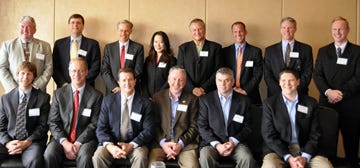A broad swath of 15 plastics industry suppliers participating in PlaticsToday's Executive Roundtable in Chicago last week agreed that the worst of the historic economic downturn is largely behind us. Their activity will bear that out. But they also cautioned that while the future is always (by definition) uncertain, the lessons of the immediate past can't be ignored by anyone who intends to stay in the game.
April 5, 2010
A broad swath of 15 plastics industry suppliers participating in PlaticsToday's Executive Roundtable in Chicago last week agreed that the worst of the historic economic downturn is largely behind us. Their activity will bear that out. But they also cautioned that while the future is always (by definition) uncertain, the lessons of the immediate past can't be ignored by anyone who intends to stay in the game.
|
From mold components and simulation to processing aids, molding machines, automation, and auxiliary equipment, suppliers from across the industry were invited to sit down and share their perspectives on the Great Recession, whether or not a recovery is really under way, and most important, what everything we're seeing means for processors now and in the immediate future.
Perhaps the most surprising take-away was the degree of consensus. There weren't a whole lot of divergent opinions regarding what the industry faced in the depths of 2009, nor were there significant differences regarding the outlook once the dust had largely settled. Unless you're one of the prescient folks with a concentrated position in medical packaging, in which case the whole crisis might have seemed a distant and irrelevant fuss, the last two years should've served as as the mother of all wake-up calls. And never mind the recession, what about the talent needed to keep the North American processing industry alive?
In short, even the most circumspect observer would venture that "the glass bottom is getting thicker." A good deal of gallows humor accompanied the by-now clichéd industry assessment generally offered in polite company: "We're cautiously optimistic." But while all acknowledged, tacitly and implicity, that a genuinely watershed moment had been negotiated, no one underestimated the fallout that is surely ongoing.
Processors and moldmakers have gone under, and more will join their ranks. Jobs have been lost that won't be coming back. Industries have been transformed, and the old way of doing things is almost certainly insufficient to the challenges ahead. Who survives? Not surprisingly, those who generally tend to survive: the adaptive, the agile, the open minded, the big-picture thinkers—the processors (and suppliers) who realize that "good enough" is never enough.
Which is to say the processors most likey to prosper are the ones who truly understand their core business, their costs, and the fact that maintaining the status quo won't keep them in business. It may sound simple, but there's a huge gulf between saying the right things and making them happen.
PlasticsToday, Injection Molding Magazine, and Modern Plastics Worldwide will be bringing you more details from these two free-form sessions in Chicago, including the 'roadmap to success' solicited therein. In the meantime, the latest numbers from the Institute for Supply Management confirm what these suppliers observed: manufacturing may have found the bottom, but plastics, in particular, still faces challenges that will test even the best-run companies.
To wit:
The Purchasing Management Index, produced by the Institute for Supply Management, posted a 59.6% for March, up from 56.5 in February, showing that the manufacturing sector grew for the eighth consecutive month. “The rate of growth is the fastest since July 2004,” stated Norbert J. Ore, head of the U.S. manufacturing survey for the ISM. “Both ‘New Orders’ and ‘Production’ rose above 60% [in March], closing the first quarter with significant momentum.
“The Employment Index decreased one percentage point to 55.1% from 56.1% in February, but employment in the sector continues to improve as the index registered a 10% month-over-month improvement indicating that manufacturers are continuing to fill vacancies,” Ore noted. “The Inventories Index provided a surprise as it indicated growth for the first time following 46 months of liquidation—perhaps signaling manufacturers' willingness to increase inventories based on expected levels of activity.”
Unfortunately for the plastics industry, the Plastics and Rubber Products manufacturing sector of the ISM survey was the only industry showing a contraction in March. —John Clark
About the Author(s)
You May Also Like



